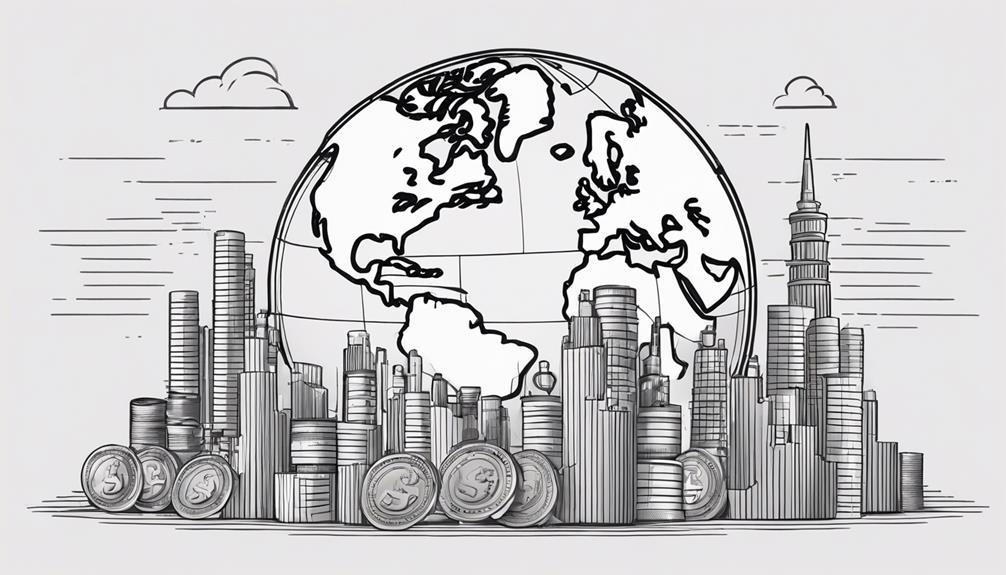The economic disparities observed among nations have long been a subject of scholarly inquiry, with various theories attempting to explain why some countries possess greater wealth than others. Factors such as historical legacies, institutional quality, government policies, educational attainment, and technological progress play pivotal roles in shaping a country's economic fortunes. Understanding the intricate interplay of these elements offers insights into the complex mechanisms driving global wealth distribution. By examining these multifaceted factors, one can begin to unravel the enigma of why certain nations thrive economically while others struggle to keep pace.
Key Takeaways
- Total factor productivity, human capital, and trade barriers influence economic disparities.
- Colonial exploitation, natural resources, and historical trade routes impact wealth distribution.
- Government policies, education, and innovation play vital roles in economic development.
- Understanding TFP, trade relations, and resource management is essential for global economic equity.
Economic Disparities Among Nations

Economic disparities among nations, delineated by substantial variations in GDP per capita, stem from multifaceted factors encompassing total factor productivity (TFP), human capital, physical capital, and institutional quality. TFP represents the efficiency at which inputs of labor and capital are utilized in the production process and is a key determinant of a country's economic performance. Disparities in TFP can lead to significant differences in output levels even when inputs are similar, thereby contributing to varying GDP per capita levels globally.
Moreover, international trade plays a crucial role in either exacerbating or bridging economic gaps between nations. Trade barriers, market access, and comparative advantages influence how countries engage in global trade, impacting their economic prosperity. Research indicates that differences in physical and human capital can explain a substantial portion of income variations between countries, with TFP accounting for the remainder. Understanding these disparities and the role of TFP and international trade is essential for policymakers aiming to address and mitigate economic inequalities on a global scale.
Historical Factors Impacting Wealth
Historical factors play a pivotal role in shaping a country's wealth. Colonial exploitation effects, natural resource abundance, and trade and commerce relations are key determinants in understanding economic disparities among nations. Examining these factors provides insight into the roots of wealth inequalities and sheds light on the complexities of global economic development.
Colonial Exploitation Effects
During the era of colonialism, the exploitation of resources and wealth from colonized territories significantly influenced the economic disparities between nations. Colonial powers extracted valuable resources and wealth from their colonies, enriching themselves while impeding the economic development of the colonized regions. The imposed exploitative systems, such as forced labor and unequal trade relationships, created lasting effects that continue to hinder the economic growth of former colonies. The wealth amassed through colonial exploitation further widened the gap between the colonizers and the colonized nations, perpetuating a legacy of inequality. Historical injustices like land dispossession and resource extraction without fair compensation have left a profound impact on the economic disparities observed in the world today.
Natural Resource Abundance
Countries endowed with abundant natural resources often exhibit higher levels of wealth accumulation due to the intrinsic value of these resources in the global economic landscape. The historical distribution of natural resources, influenced by colonization and exploitation, has played a significant role in shaping the economic prosperity of nations. Effective management and utilization of these resources, including policies on extraction, trade, and governance, are crucial factors impacting a country's wealth derived from natural resources. Strategic investments, diversification, and sustainable practices can help countries leverage their natural resource wealth for long-term economic stability. However, natural disasters and environmental degradation pose risks to this wealth, underscoring the importance of sustainable resource management.
| Natural Resource Abundance | Economic Prosperity |
|---|---|
| Abundant oil reserves | Increased GDP |
| Rich mineral deposits | Export revenues |
| Fertile agricultural land | Food security |
| Timber and forests | Industry growth |
| Precious metals | Foreign investments |
Trade and Commerce Relations
The evolution of global trade networks has significantly influenced the economic prosperity of nations through historical interactions and commercial exchanges.
- Historical trade routes like the Silk Road and Spice Trade contributed to the wealth of countries by facilitating the exchange of goods and ideas.
- Colonialism and imperialism enabled certain countries to exploit resources and establish trade relationships that boosted their wealth at the expense of others.
- The Industrial Revolution in the 18th and 19th centuries sparked economic growth in Western countries, giving them a significant financial advantage over regions that lagged behind in industrialization.
- Globalization in the 20th century further shaped trade dynamics, allowing countries with advanced infrastructure and technology to dominate international commerce and accumulate more wealth.
- Economic policies, such as protectionism or free trade agreements, have influenced the flow of goods and capital, impacting the economic prosperity of nations differently based on their trade and commerce strategies.
Role of Natural Resources in Wealth
Natural resources play a crucial role in shaping a country's wealth by providing avenues for economic growth and development. The impact of resource abundance, the level of dependence on these resources in the economy, and the strategies employed for their management are key factors influencing a nation's financial status. While natural resources can be a valuable asset, proper management and diversification strategies are essential to ensure long-term economic stability and resilience.
Resource Abundance Impact
Resource abundance plays a pivotal role in determining a nation's economic prosperity and financial stability. Natural resources such as oil, minerals, or fertile land have a significant impact on a country's wealth through export revenues and domestic production. Here are five crucial points to consider regarding the impact of resource abundance:
- Countries with abundant natural resources often have higher GDP and foreign exchange earnings.
- Mismanagement or over-reliance on natural resources can lead to economic instability and inequality.
- Resource-rich nations may face challenges like the 'resource curse,' where wealth does not benefit the entire population equally.
- Diversification of the economy away from heavy reliance on natural resources is vital for sustainable economic growth.
- Reduced vulnerability to commodity price fluctuations can be achieved through economic diversification.
Resource Dependence on Economy
Resource abundance fundamentally shapes a nation's economic landscape as it influences the wealth distribution and stability within its borders. Countries endowed with natural resources often experience higher incomes through extraction and exports. However, this dependency can lead to challenges such as price volatility, resource depletion, and limited economic diversification. The phenomenon known as the 'resource curse' exemplifies how excessive reliance on resources can impede long-term economic development and stability. Total factor productivity (TFP) plays a crucial role in determining the efficiency with which resources are utilized. To counter the negative impacts of resource dependence, effective resource management strategies like sovereign wealth funds and investments in human capital are vital. Diversifying the economy beyond natural resources through industrialization, innovation, and sustainable development is essential for sustained economic growth and stability.
Resource Management Strategies
Countries endowed with significant natural resources often grapple with the complexities of managing their wealth and ensuring long-term economic stability.
- Effective resource management strategies can enhance economic development.
- Sustainable extraction practices are crucial for long-term wealth stability.
- Diversification of resource-based industries reduces dependency on a single resource.
- Balancing economic development with environmental conservation is vital for sustainable wealth creation.
- Global commodity price fluctuations impact the economic prosperity of natural resource-rich countries.
Influence of Government Policies on Economy
How do government policies influence the economic trajectory of a nation? Government policies have a substantial impact on a country's economic performance. Strategic decisions related to taxation, spending, infrastructure development, and industry regulation can shape the overall economic growth of a nation. Policies that promote innovation, education, and entrepreneurship can boost total factor productivity (TFP) and enhance a country's competitiveness in the global economy. Moreover, sound fiscal and monetary policies are essential for stabilizing the economy and fostering sustainable growth over the long term. By providing stability, transparency, and investment incentives, governments can attract foreign capital and stimulate economic development within their borders.
| Government Policies Impact on Economy | Examples |
|---|---|
| Taxation Policies | Tax cuts or increases affecting consumer spending |
| Infrastructure Development | Building roads, bridges, and public transportation systems |
| Education Policies | Investing in schools, universities, and vocational training |
| Innovation Promotion | Funding research and development initiatives |
These examples demonstrate how government policies directly influence various aspects of the economy, shaping its growth and competitiveness.
Impact of Education and Innovation

The symbiotic relationship between education and innovation is pivotal in shaping a nation's economic trajectory and fostering sustainable growth. Education serves as the foundation for fostering innovation, which, in turn, drives economic progress. Here are five key points highlighting the impact of education and innovation on a country's economic prosperity:
- Higher Education Levels Lead to Increased Total Factor Productivity (TFP): Countries with well-educated populations tend to exhibit higher levels of TFP, reflecting the efficiency at which labor and capital are utilized in the production process.
- Research and Education Drive Technological Advancements: Investment in education and research activities lays the groundwork for technological progress, which is a key driver of innovation and economic growth.
- Innovation Spurs Economic Competitiveness: Innovations stemming from a strong educational foundation can create new industries, enhancing a country's competitiveness on a global scale.
- Education Enhances Productivity Levels: Education equips individuals with the skills and knowledge necessary to contribute effectively to the workforce, thereby boosting overall productivity levels.
- Adaptability to Technological Changes: Education and innovation enable a country to adapt swiftly to technological advancements, ensuring continued relevance in an ever-evolving global economy.
Global Trade and Wealth Disparities
Global trade dynamics significantly influence the distribution of wealth among nations, highlighting the interconnectedness of economic systems on a global scale. Trade barriers, by restricting the flow of goods and services, can exacerbate wealth disparities between countries. Conversely, reducing these barriers has the potential to promote economic growth and bridge the wealth gap between rich and poor nations. The impact of international trade policies on economic disparaties underscores the importance of fostering fair and open trade practices. It is evident that international trade plays a crucial role in shaping global wealth distribution and influencing economic development outcomes. Efficient trade relationships not only enhance productivity but also contribute to narrowing income differences among nations. Therefore, understanding the relationship between trade and wealth disparaties is essential for creating a more equitable global economic landscape. By fostering transparent and mutually beneficial trade agreements, countries can work towards reducing wealth disparities and promoting sustainable economic development worldwide.
Cultural and Social Influences on Wealth

Cultural values shape individuals' attitudes towards work ethic, entrepreneurship, and wealth accumulation, thus influencing a country's economic prosperity. Social norms play a crucial role in determining how savings, investments, and risk-taking behavior impact wealth generation within a society. Community support structures contribute to the creation of economic opportunities, fostering prosperity through cooperation, trust, and social mobility.
Social Norms Impact Wealth
Influenced by deeply ingrained cultural and social norms, wealth accumulation and distribution vary significantly across societies, shaping economic disparities and opportunities for advancement.
- Cultural norms and values play a crucial role in how wealth is perceived and accumulated.
- Social structures and traditions within a society can influence wealth distribution patterns.
- Emphasis on communal wealth and cooperation in some cultures can lead to distinct economic outcomes.
- The presence of strong social institutions like family networks can impact wealth accumulation.
- Understanding the cultural and social factors that influence wealth creation provides insights into economic conditions globally.
Cultural Values Affect Income
Social norms and cultural values intertwine to shape the income levels within societies, impacting wealth accumulation and economic disparities. In cultures that emphasize productivity through hard work, education, and entrepreneurship, individuals are more likely to increase their standard of living over time. This can lead to higher income levels and economic prosperity compared to societies with different values. The table below highlights how cultural values influence income through productivity and its subsequent impact on the standard of living.
| Cultural Values | Productivity | Standard of Living |
|---|---|---|
| Hard Work | High | Improved |
| Education | Increased | Enhanced |
| Entrepreneurship | Growth | Elevated |
Community Support Shapes Prosperity
The interconnectedness of community support systems within societies plays a pivotal role in shaping economic prosperity and wealth distribution.
- Social capital, encompassing trust and cooperation, influences economic success.
- High levels of social capital in countries lead to stable and prosperous economies.
- Active community engagement and support contribute to economic resilience and innovation.
- Social networks and solidarity foster growth and development in affluent nations.
- Cultural emphasis on collaboration and mutual assistance creates an environment conducive to economic advancement.
These factors highlight the significance of community support in shaping a nation's total factor productivity (TFP) and overall economic well-being. By fostering strong social ties and support systems, countries can enhance their prosperity and wealth distribution.
Technological Advancements and Economic Disparities

Technological advancements are pivotal in shaping the economic disparities observed among different countries. Countries with advanced technologies often exhibit higher levels of total factor productivity (TFP), which is a key driver of economic growth. The adoption and innovation of cutting-edge technologies enable nations to enhance their productivity levels, leading to increased wealth creation and competitiveness in the global market. Access to technology infrastructure and investments in research and development play a crucial role in determining a country's ability to innovate and thrive economically. Disparities in technological capabilities and utilization can result in varying levels of economic development and prosperity among nations. To illustrate the impact of technological advancements on economic disparaties, the table below highlights key factors influencing a country's economic growth based on its technological advancements:
| Technological Advancements | Economic Growth | Innovation Opportunities |
|---|---|---|
| Advanced Technologies | High | Abundant |
| Technology Infrastructure | Medium | Significant |
| Research and Development | High | Accessible |
Income Inequality Within Countries
Amidst the intricate tapestry of economic structures, income inequality within countries stands as a striking manifestation of disparities in wealth distribution. This phenomenon is often quantified using the Gini coefficient, with higher values indicating greater inequality. Factors contributing to income inequality within countries encompass differences in education, skills, access to resources, and opportunities. In various nations, income inequality has shown a growing trend over time, presenting significant social and economic challenges. Government policies, taxation systems, and social welfare programs play crucial roles in shaping the level of income inequality within a country. Addressing income inequality necessitates comprehensive strategies aimed at fostering equal opportunities and reducing disparities in wealth distribution.
- Income inequality within countries is commonly measured using the Gini coefficient.
- Factors such as education, skills, and access to resources contribute to income inequality within nations.
- In some countries, income inequality has been on the rise, posing social and economic challenges.
- Government policies and social welfare programs can impact the level of income inequality within a country.
- Comprehensive strategies are needed to tackle income inequality by promoting equal opportunities and reducing wealth disparities.
Future Trends in Global Wealth Distribution

In forecasting the trajectory of global wealth distribution, the interplay of emerging economies, technological innovations, and evolving consumer dynamics emerges as pivotal determinants shaping future economic landscapes. By 2030, a significant shift is expected, with countries like China and India surpassing developed nations in economic size. Technological advancements, including digital economies, will play a crucial role in shaping these patterns. The rise of the middle class in developing countries will drive changes in wealth distribution, impacting consumer markets and investments. Climate change considerations are also influencing trends, with green technologies driving economic growth. Geopolitical shifts and trade dynamics will further impact wealth distribution, highlighting the importance of regional collaborations. Total factor productivity (TFP) will be a key factor differentiating between rich and poor countries in the future.
| Factors Influencing Future Wealth Distribution | |
|---|---|
| Emerging Economies | Technological Innovations |
| Middle-Class Growth | Climate Change Considerations |
Frequently Asked Questions
Why Are Some Countries Richer Than Others?
Countries vary in wealth due to a combination of economic policies, technological advancements, natural resources, and trade agreements. Factors like innovation, education, infrastructure, and governance influence economic growth and income distribution. Nations with robust policies fostering productivity, innovation, and resource utilization tend to be wealthier. Strategic trade partnerships and investments in human capital also play critical roles in determining the economic prosperity of countries.
What Makes a Country Richer?
To enhance a country's wealth, strategic investment strategies and sound economic policies play pivotal roles. Diligent allocation of resources, fostering innovation, promoting entrepreneurship, and facilitating trade are essential components for economic growth. Implementing effective policies that attract investments, encourage productivity, and enhance competitiveness contribute significantly to a nation's prosperity. By focusing on sustainable development, fostering a skilled workforce, and creating a conducive macroeconomic environment, countries can pave the way towards greater economic wealth.
Why Do Some Countries Have a Higher GDP Than Others?
Economic development and inequality are influenced by various factors such as global trade and natural resources. Disparities in GDP among countries can be attributed to differential access to resources, trade relationships, and infrastructure. Policies promoting innovation, education, and investment play crucial roles in fostering economic growth. Historical legacies, governance quality, and market access also shape a country's GDP, highlighting the multifaceted nature of wealth disparities on the global stage.
Why Do Some Countries Have High Income?
Countries achieve high income levels through a combination of favorable wealth distribution and sound economic policies. Wealth distribution ensures resources are allocated efficiently, fostering economic growth. Effective economic policies, such as investment in infrastructure and human capital, create an environment conducive to wealth generation. By prioritizing equitable distribution and implementing strategic economic measures, countries can propel themselves towards higher income levels, promoting overall prosperity and development.
Conclusion
In conclusion, the disparities in economic well-being among countries can be attributed to a complex interplay of factors such as historical legacies, natural resources, government policies, education, innovation, culture, and technology. As the global economy continues to evolve, it is essential for countries to focus on enhancing their institutional frameworks, promoting innovation, and reducing income inequalities to ensure sustainable economic growth and prosperity. As the adage goes, "The only constant is change."
